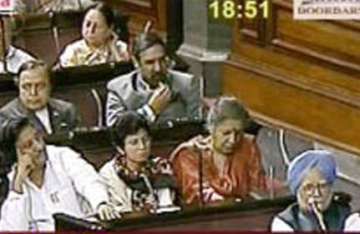Reservation of one-third seats in Lok Sabha and Assemblies for women cleared by the Rajya Sabha today will also apply in case of constituencies reserved for Scheduled Castes and Scheduled Tribes. The landmark Women's Reservation Bill also envisages rotation of seats so reserved for women.
In continuation of the existing provisions already mandating reservations for scheduled caste and scheduled tribes, one-third of such SC and ST candidates must be women, according to the provisions of the Constitution (One Hundred and Eighth Amendment Bill, 2008), popularly known as Women's Reservation Bill. There are 543 seats in the Lok Sabha, out of which 122 are already reserved for SC and ST candidates.
The Bill, which has touched a raw nerve in some political outfits, seeks to insert two new articles in the Constitution to provide one-third reservation to women in Legislatures. "After article 330 of the Constitution, the following article shall be inserted: 330A. Seats shall be reserved for women in the House of the People," it said.
To provide reservation for women in state Assemblies, the Bill seeks to insert Article 332A in the Constitution.
According to the Bill, provided that where a seat reserved for Scheduled Castes and Schedule Tribes in relation to a state or a Union Territory is one, then in every block comprising of three Lok Sabha elections, the seat in the first LS election "shall" be reserved for women belonging to SCs or STs "and no seat shall be reserved in other two general elections".
The Bill adds that if the seats reserved for SCs and STs in relation to a state or a UT are two, then "One seat shall be reserved for women belonging to the SCs or the STs in the first two general elections in such a manner that the same constituency is not reserved for women in both the aforesaid elections."
Also, according to the Bill introduced in Rajya Sabha in May 2008, no seat shall be reserved for women belonging to the SCs and STs in the third general election.
In case of general or non-reserved seats, the Bill states that in relation to a state or Union Territory where the seat is one, then in every block of three LS elections the seat in the first general election will be reserved for women and "no seat shall be so reserved for women in the other two general elections."
Where the general seats are two in relation to a state or a UT, then one seat will be reserved for women in the first two general elections "in such a manner that the same constituency is not reserved for women in both the aforesaid elections; and no seat shall be reserved for women in the third general elections". PTI
Latest India News
